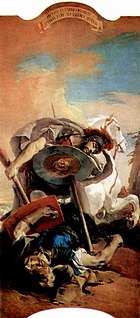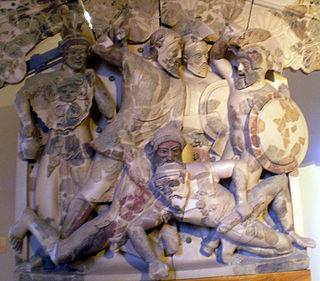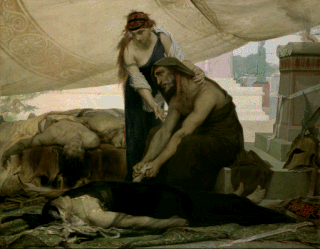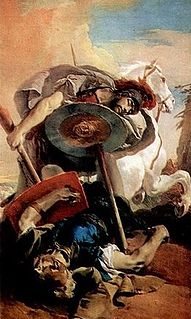
Tisiphone, or Tilphousia, was one of the three Erinyes or Furies. Her sisters were Alecto and Megaera. She and her sisters punished crimes of murder: parricide, fratricide and homicide.

Seven Against Thebes is the third play in an Oedipus-themed trilogy produced by Aeschylus in 467 BC. The trilogy is sometimes referred to as the Oedipodea. It concerns the battle between an Argive army led by Polynices and the army of Thebes led by Eteocles and his supporters. The trilogy won the first prize at the City Dionysia. The trilogy's first two plays, Laius and Oedipus, as well as the satyr play Sphinx, are no longer extant.

In Greek mythology, Eteocles was a king of Thebes, the son of Oedipus and either Jocasta or Euryganeia. Oedipus killed his father Laius and married his mother without knowing his relationship to either. When the relationship was revealed, he was expelled from Thebes. The rule passed to his sons Eteocles and Polynices. However, because of a curse from their father, the two brothers did not share the rule peacefully and died as a result, ultimately killing each other in battle for control of the city. Upon his death, Eteocles was succeeded by his uncle, Creon.

In Greek mythology, Polynices was the son of Oedipus and either Jocasta or Euryganeia and the older brother of Eteocles. When his father, Oedipus, was discovered to have killed his father and married his mother, he was expelled from Thebes, leaving his sons Eteocles and Polynices to rule. Because of a curse put on them by their father Oedipus, the two sons did not share the rule peacefully and died as a result, killing each other in battle for control over Thebes.

Creon, is a figure in Greek mythology best known as the ruler of Thebes in the legend of Oedipus.
In Greek mythology, Adrastus or Adrestus, , was a king of Argos, and leader of the Seven against Thebes. He was the son of the Argive king Talaus, but was forced out of Argos by his dynastic rival Amphiaraus. He fled to Sicyon, where he became king. Later he reconciled with Amphiaraus and returned to Argos as its king.

Publius Papinius Statius was a Greco-Roman poet of the 1st century CE. His surviving Latin poetry includes an epic in twelve books, the Thebaid; a collection of occasional poetry, the Silvae; and an unfinished epic, the Achilleid. He is also known for his appearance as a guide in the Purgatory section of Dante's epic poem, the Divine Comedy.

In Greek mythology, Argia or Argea was a daughter of King Adrastus of Argos, and of Amphithea, daughter of Pronax. She was married to Polynices, the exiled king of Thebes, and bore him three sons: Thersander, Adrastus, and Timeas.

In Greek mythology, Jocasta, also rendered Iocaste and also known as Epicaste, was a daughter of Menoeceus, a descendant of the Spartoi Echion, and queen consort of Thebes. She was the wife of first Laius, then of their son Oedipus, and both mother and grandmother of Antigone, Eteocles, Polynices and Ismene. She was also sister of Creon and mother-in-law of Haimon.
According to the medieval poet Jean Bodel, the Matter of Rome is the literary cycle of Greek and Roman mythology, together with episodes from the history of classical antiquity, focusing on military heroes like Alexander the Great and Julius Caesar. Bodel’s division of literary cycles also included the Matter of France and the Matter of Britain. The Matter of Rome includes the Matter of Troy, consisting of romances and other texts based on the Trojan War and its legacy, including the adventures of Aeneas.
In Greek mythology, the Epigoni or Epigonoi are the sons of the Argive heroes, the Seven against Thebes, who had fought and been killed in the first Theban war, the subject of the Thebaid, in which Polynices and his allies attacked Thebes because Polynices' brother, Eteocles, refused to give up the throne as promised. The second Theban war, also called the war of the Epigoni, occurred ten years later, when the Epigoni, wishing to avenge the death of their fathers, attacked Thebes.

The Thebaid or Thebais was a region in ancient Egypt, comprising the 13 southernmost nomes of Upper Egypt, from Abydos to Aswan.

The Seven against Thebes were seven champions in Greek mythology who made war on Thebes. They were chosen by Adrastus, the king of Argos, to be the captains of an Argive army whose purpose was to restore Oedipus' son Polynices to the Theban throne. Adrastus, although always the leader of the expedition against Thebes, was not always counted as one of the Seven champions. Usually the Seven were Polynices, Tydeus, Amphiaraus, Capaneus, Parthenopaeus, Hippomedon, and Adrastus or Eteoclus, whenever Adrastus is excluded. They tried and failed to take Thebes, and all but Adrastus died in the attempt.

The Theban Cycle is a collection of four lost epics of ancient Greek literature which tells the mythological history of the Boeotian city of Thebes. They were composed in dactylic hexameter verse and believed to be recorded between 750 and 500 BC. The epics took place before the Trojan War and centered around the Theban royal family.

The Phoenician Women is a tragedy by Euripides, based on the same story as Aeschylus' play Seven Against Thebes. It was presented along with the tragedies Hypsipyle and Antiope. With this trilogy, Euripides won the second prize. The title refers to the Greek chorus, which is composed of Phoenician women on their way to Delphi who are trapped in Thebes by the war. Unlike some of Euripides' other plays, the chorus does not play a significant role in the plot, but represents the innocent and neutral people who very often are found in the middle of war situations. Patriotism is a significant theme in the story, as Polynices talks a great deal about his love for the city of Thebes but has brought an army to destroy it; Creon is also forced to make a choice between saving the city and saving the life of his son.

The Thebaid is a Latin epic poem written by the Roman poet Statius. Published in the early 90s AD, it contains 12 books and recounts the clash of two brothers, Eteocles and Polynices, over the throne of the Greek city of Thebes. After Polynices is sent into exile, he forges an alliance of seven Greek princes and embarks on a military campaign against his brother.
Epigoni was an early Greek epic, a sequel to the Thebaid and therefore grouped in the Theban cycle. Some ancient authors seem to have considered it a part of the Thebaid and not a separate poem.

The Thebaid or Thebais, also called the Cyclic Thebaid, is an Ancient Greek epic poem of uncertain authorship sometimes attributed by early writers to Homer, for example, by the poet Callinus and the historian Herodotus to Homer. It told the story of the war between the brothers Eteocles and Polynices, and was regarded as forming part of a Theban Cycle. Only fragments of the text survive.
La Thébaïde is a tragedy in five acts in verse by Jean Racine first presented, without much success, on June 20, 1664, at the Palais-Royal in Paris. The twins, along with their sister Antigone, were children borne of the incestuous marriage of the Theban king Oedipus and his mother Jocasta. The play depicts the struggle and death of the young son of Oedipus, as well as that of Antigone. This subject had already occupied many authors before Racine. Thus, the young playwright, still fairly inexperienced, drew particularly from the Antigone of Sophocles, the Phoenician Women of Euripides, but especially the Antigone of Jean Rotrou and the tragedies of Pierre Corneille.

Eteocle e Polinice is an opera in 3 acts composed by Giovanni Legrenzi with an Italian language libretto by Tebaldo Fattorini based on The Thebaid. The opera premiered at the Teatro San Salvador in Venice on 13 December 1674.













